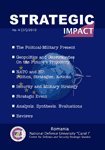(NOT SO) SPECIAL RELATIONSHIPS EXPLAINING ALLIANCE BEHAVIOUR IN THE ENGLISH SPEAKING WORLD
(NOT SO) SPECIAL RELATIONSHIPS EXPLAINING ALLIANCE BEHAVIOUR IN THE ENGLISH SPEAKING WORLD
Author(s): Dylan KissaneSubject(s): Security and defense, Military policy, Peace and Conflict Studies
Published by: Carol I National Defence University Publishing House
Keywords: English speaking states; alliances; wars; Anglosphere;
Summary/Abstract: Throughout the 20th century, the major powers in the global Anglosphere often found themselves allies in armed conflict. These war-time alliances – sometimes temporary, more often part of a longer term cooperation – are sometimes held to arise because of common histories, common values, similar national ideologies and similar notions of international right and wrong. Indeed, the political rhetoric surrounding the declarations of war has often cited such factors as colonial history, international friendship and “special relationships” as motivators for joining armed coalitions against third party states. Yet while there stand stark examples of these major English speaking powers acting entirely in congress there exist numerous instances where one or more of these powers chose not to join a coalition alongside their Anglophonic associates. This article argues that explanations of Anglophonic coalitions that rely on notions of a shared history, similar political ideologies, common political and social values or similar notions of international morality all fall short of explaining the coalition joining/rejecting behaviour of the major powers of the Anglosphere in war-time during the 20th century. Drawing on data from the Correlates of War (CoW) project, this article will show that pure national interest drove the decisions of states to join or reject coalitions, lending strong support to a structural realist explanation for their behaviour, with this conclusion presenting opportunities for re-assessing alliance politics in Eastern Europe and South America.
Journal: Strategic Impact
- Issue Year: 2010
- Issue No: 37
- Page Range: 112-121
- Page Count: 10
- Language: English

